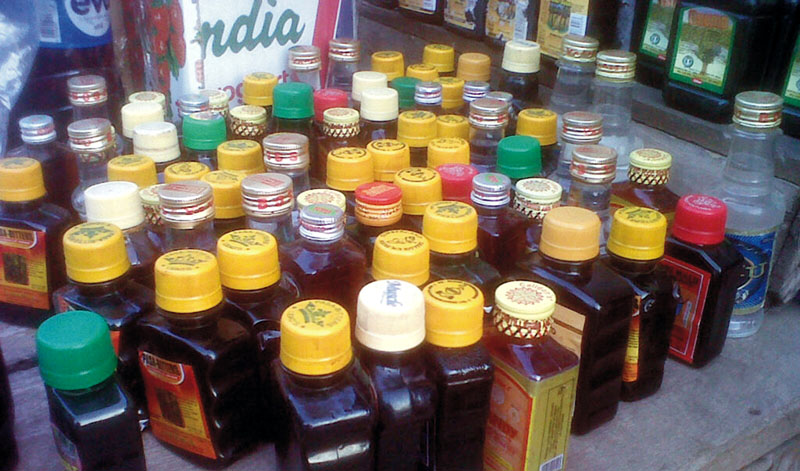In-Depth Analysis of ‘Goskolo’ Risks and Societal Impact
‘Goskolo,’ a potent locally brewed alcoholic gin, poses a severe health threat far beyond typical alcoholic beverages. Known for its high toxicity, affordability, and ease of production, ‘Goskolo‘ is leading to widespread liver damage and increasing the risk of hepatitis among its consumers. This hazardous gin is not just a health risk; it is rapidly becoming a public crisis that demands immediate attention.

In Plateau State, the gin’s popularity is causing alarm among citizens, particularly regarding its impact on youth. The widespread consumption of ‘Goskolo’ has resulted in school dropouts and stunted potential, with many young people falling victim to its destructive effects. The local culture of illicit brewing, while providing a source of income for some, is exacting a heavy toll on the community’s health and well-being.
Parents and community leaders are increasingly vocal about the detrimental influence of ‘Goskolo.’ The gin’s appeal lies in its low cost and easy availability, making it a popular choice among cash-strapped youth. However, its immediate and long-term health impacts are devastating. Medical experts warn that the toxins in ‘Goskolo’ can cause severe liver damage, impair cognitive function, and increase the risk of chronic diseases, including liver cirrhosis and various forms of hepatitis.
The chemical composition of ‘Goskolo’ makes it especially harmful. Unlike regulated alcoholic beverages, which are produced under strict safety guidelines, ‘Goskolo’ is often concocted in unregulated, unhygienic conditions. This results in a product that can contain dangerous levels of methanol, a toxic alcohol that can cause blindness, organ failure, and death. The lack of oversight in its production means that consumers have no way of knowing the true contents of what they are ingesting, making every drink a potential risk.
A tragic example is the case of Mrs. Martha Paul, a 60-year-old resident of Tudun Wada in Jos North LGA. Her son, a promising 300-level student at the University of Jos, succumbed to the effects of ‘Goskolo’ in 2022. Hooked on the illicit gin, he developed severe complications affecting his internal organs, which led to his untimely death. Mrs. Paul now tirelessly advocates against the consumption of ‘Goskolo,’ hoping to spare other families from similar heartache.
The broader societal implications of ‘Goskolo’ are also alarming. Youth who become addicted to this gin often abandon their educational and career aspirations, leading to increased dropout rates and a loss of future leaders and professionals. The economic impact is significant, with many affected individuals becoming unable to contribute productively to their communities. The social fabric of Plateau State is at risk as the gin erodes the potential and vitality of its younger generation.
Educational institutions in Plateau State are noticing a troubling trend: the rise in ‘Goskolo’ consumption correlates with a decline in student performance and attendance. Teachers report that students addicted to the drink often show a lack of focus, reduced cognitive abilities, and increased absenteeism. This not only affects their academic performance but also disrupts the learning environment for other students.
Community leaders and health practitioners are calling for immediate action to curb the spread of ‘Goskolo.’ They argue that without intervention, the youth of Plateau State face a bleak future. The call to action includes stricter enforcement of existing laws against illegal brewing and distribution, as well as the introduction of new regulations specifically targeting the production and sale of ‘Goskolo.’
In response to this growing crisis, there is a pressing call for regulatory action. Mrs. Paul, alongside other concerned citizens, is urging the government to implement strict measures to ban the production and consumption of ‘Goskolo.’ This, they believe, is crucial to curbing the adverse health effects and societal challenges associated with its use. Without decisive intervention, the cycle of addiction and its devastating consequences will continue to afflict Plateau’s youth.
Furthermore, healthcare providers in Plateau State are witnessing an uptick in cases related to ‘Goskolo’ consumption. Hospitals report a surge in admissions for alcohol poisoning, liver disease, and other health complications linked to the toxic gin. Medical staff are often overwhelmed by the volume of cases, which stretch already limited healthcare resources. This strain on the healthcare system underscores the urgent need for a comprehensive strategy to address the issue.
The economic ramifications of ‘Goskolo’ are also significant. The time and resources spent by families caring for affected members drain household incomes and hinder economic productivity. Many families find themselves grappling with the dual burden of lost income due to incapacitated family members and increased healthcare costs, plunging them further into poverty. This cycle of poverty and health decline creates a broader economic impact that affects the entire community.
The cultural acceptance of ‘Goskolo’ as a cheap alternative to mainstream alcoholic beverages complicates efforts to combat its use. Many young people, especially those from lower socio-economic backgrounds, view the gin as a viable escape from their daily hardships. Changing this perception requires not only strict legal measures but also a cultural shift, where the community collectively rejects ‘Goskolo’ and seeks healthier, more sustainable alternatives.
Educational campaigns play a crucial role in this fight. Public health initiatives must focus on educating the youth about the dangers of ‘Goskolo.’ These campaigns should leverage local media, social platforms, and community gatherings to reach a broad audience. Emphasizing personal stories, like that of Mrs. Martha Paul’s son, can make the message more relatable and impactful, encouraging young people to make informed choices about their health.
Rehabilitation and support services are also essential. Many youths already addicted to ‘Goskolo’ require medical and psychological support to overcome their dependence. Establishing accessible rehabilitation centers and providing counseling services can help these individuals reclaim their lives and reintegrate into society. Support networks, including family and community groups, can play a pivotal role in the recovery process by offering ongoing encouragement and assistance.
The battle against ‘Goskolo’ requires a coordinated effort involving community education, law enforcement, and public health initiatives. Awareness campaigns aimed at educating young people about the dangers of ‘Goskolo’ are essential. Moreover, providing support and rehabilitation for those already affected by the gin can help break the cycle of addiction and pave the way for a healthier, more prosperous future for Plateau State.
The threat posed by ‘Goskolo’ to the youth of Plateau State cannot be overstated. Immediate and sustained action is required to address this public health crisis. By banning the production and sale of this dangerous gin, enforcing existing laws, and providing education and support to affected individuals, Plateau State can safeguard the health and future of its young population. The call to reject ‘Goskolo’ is not just a plea for better health but a demand for a brighter, more hopeful future for all.




